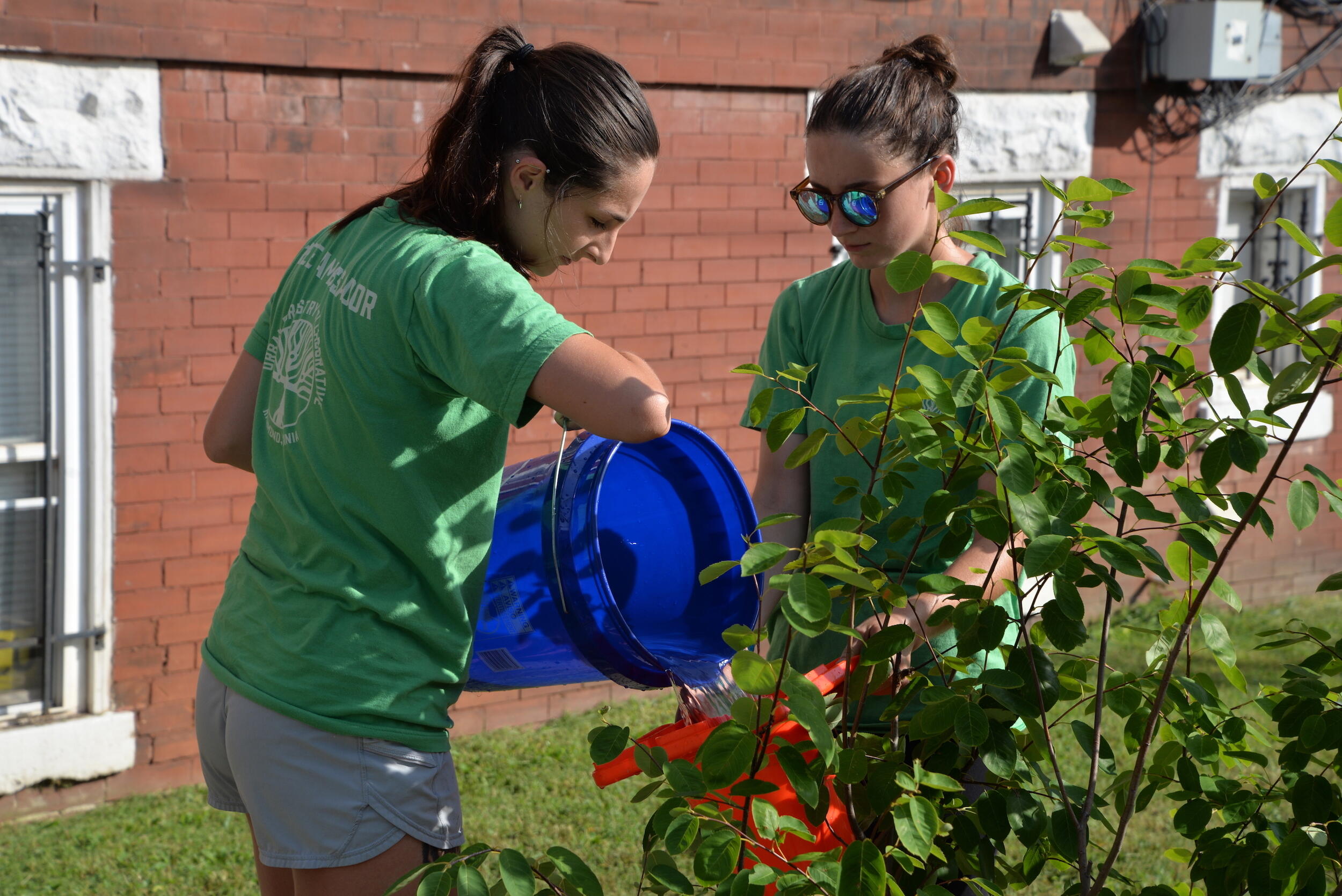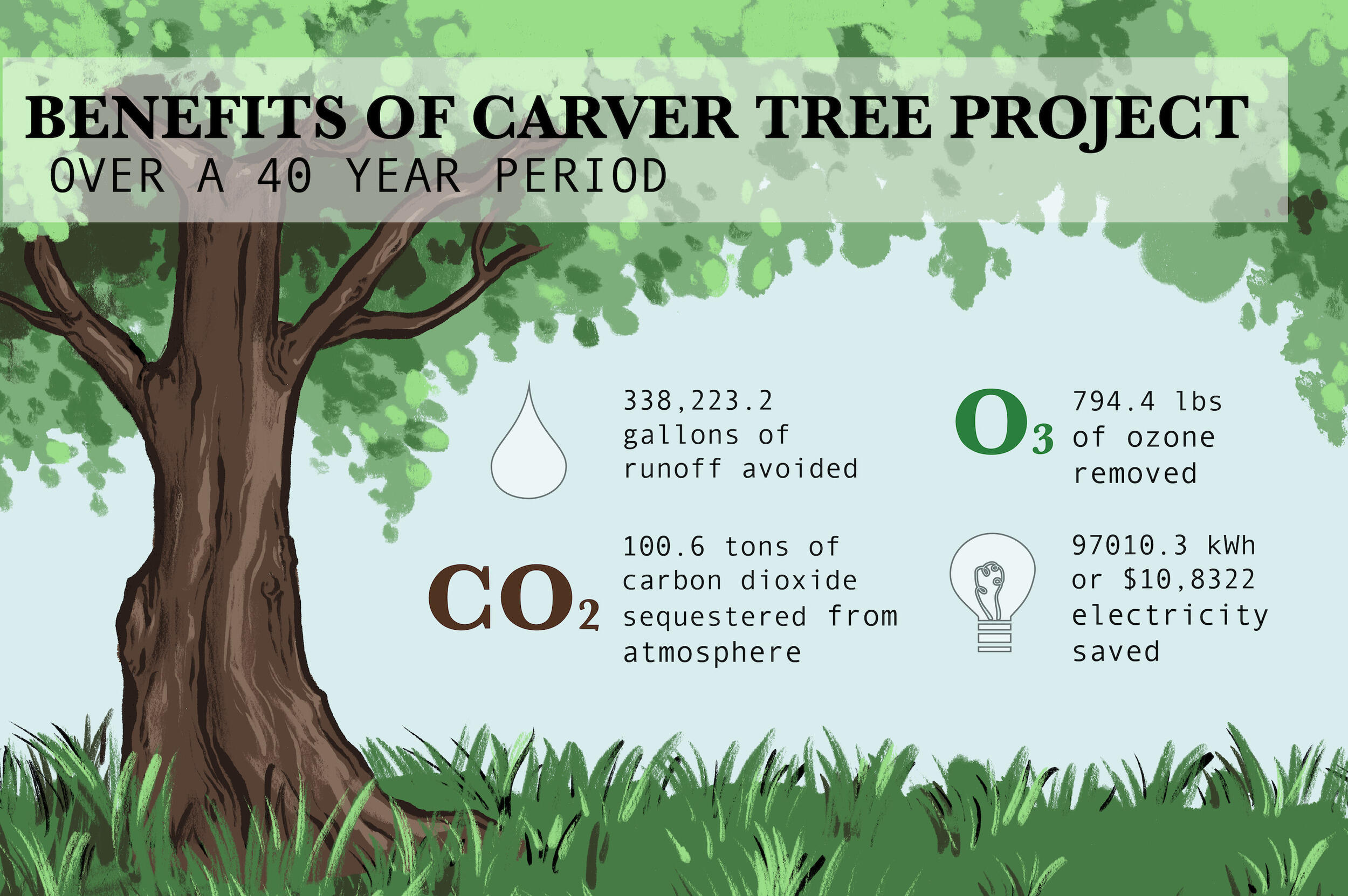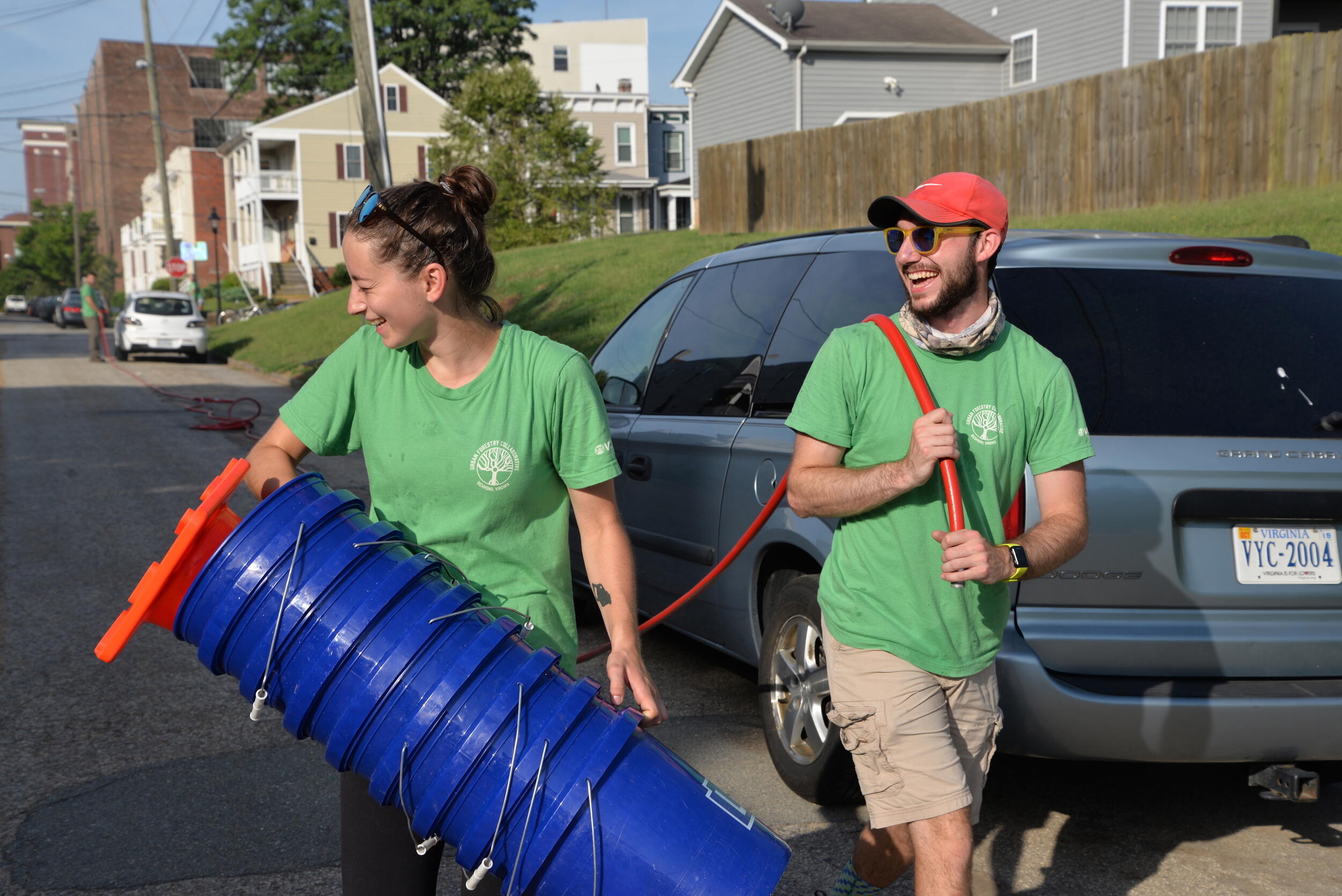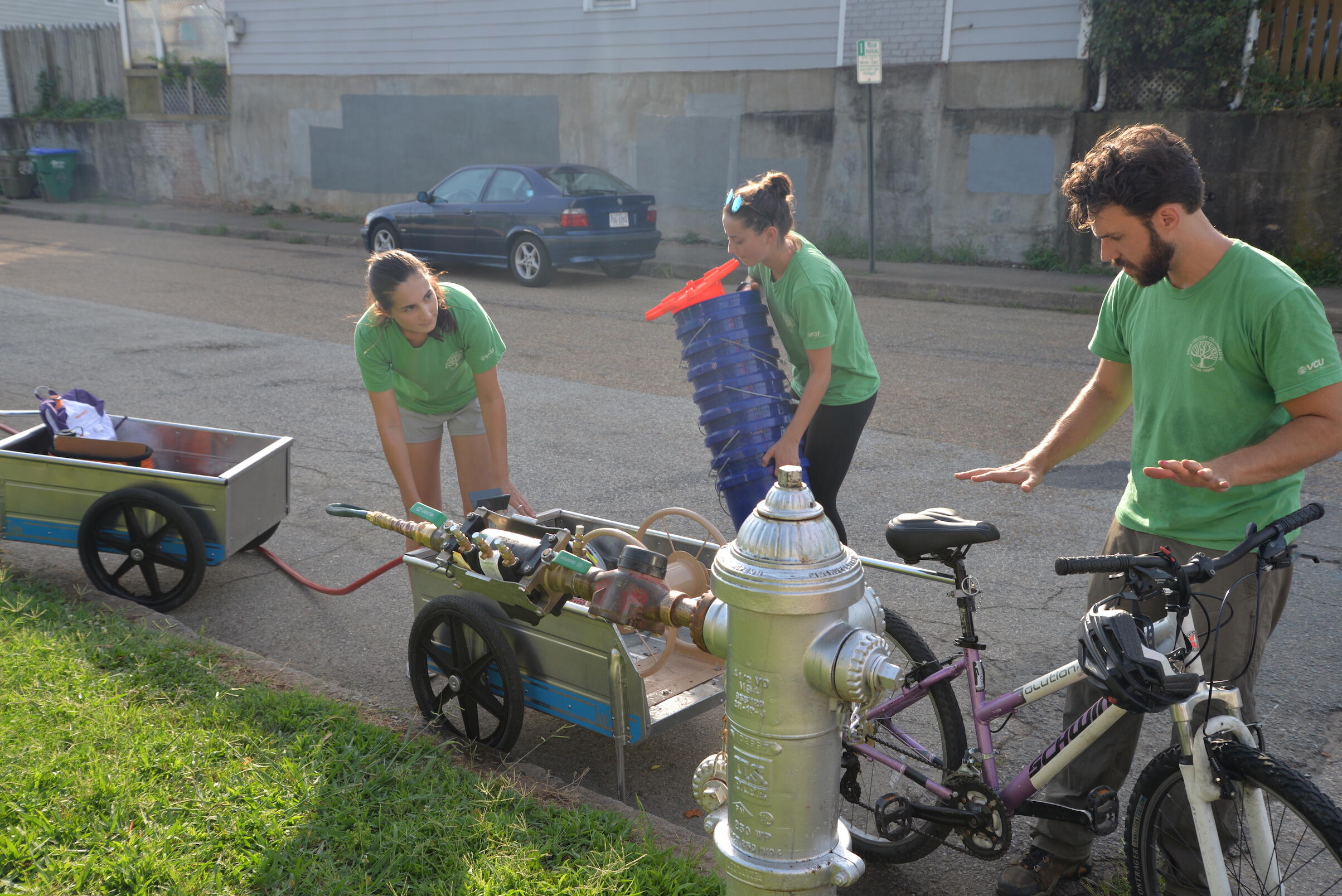
Sept. 24, 2019
Carver Tree Project internship program grows roots within community
Throughout the summer, students watered and maintained 62 trees along the neighborhood’s thoroughfares.
Share this story
If you traversed the streets of Richmond’s Carver neighborhood on a certain weekday summer morning, you might have spotted a team of green-shirted Virginia Commonwealth University students tending to some of the area’s youngest, and growing, residents.
Throughout the summer, VCU Center for Environmental Studies undergraduates Diana Kessler and Alex Eaton, along with recent graduate Catherine McGuigan, watered and maintained 62 trees along Carver’s thoroughfares, conducted inventories of trees, and developed communication materials. The students were participating in a summer internship program with the Carver Tree Project. Initiated in November 2018 through VCU’s Office of Sustainability, the pilot project of the Urban Forestry Collaborative aims to collaborate with campus-adjacent neighborhoods to create a greener, sustainable place to live through direct action and educating the community about the benefits of trees.
“I’m really excited to see students getting involved in the Richmond community and being able to apply things they learn in the classroom to a real-world setting such as the Carver neighborhood,” said Wyatt Carpenter, sustainability projects and program coordinator.
Nurturing growth
Each of the planted saplings is at a crucial stage, Carpenter said, as it takes up to three years for a street tree to establish a healthy root and canopy system. To ensure they continue growing even during the hottest months, the team uses a “gatorbag” that wraps around the trunk of a tree. Filled through either buckets or two 100-foot hoses and holding up to 15 gallons of water, the bags release their contents over the course of an eight- to 10-hour period. As the trees grow, their presence will help lower temperatures across the neighborhood, intercept rainwater to mitigate flooding, and help make the air more breathable by circulating out pollution.

Carpenter said the team did weeding and structural pruning, which allows the trees to grow while avoiding conflicts such as power lines, buildings and people. “Two of our interns have been through the Richmond Tree Steward training course, so they know proper pruning techniques,” Carpenter said. While pruning molds the shape of the tree, weeding helps limit competition for soil nutrients around the sapling’s roots and prevents trunk damage due to lawnmowers and weed whackers.
When not directly caring for the saplings, the interns created an inventory of trees in Carver and on VCU’s Monroe Park Campus using the ArcGIS Collector app. With data gathered through the inventory process, Carpenter hopes to provide the public with statistics detailing the ecosystem and economic benefits that trees provide as well as track their growth and changes over time.
An enlightening experience
Alongside Carpenter, the team split up care of the trees over the course of two days a week, Wednesdays and Thursdays, with work finishing before daytime temperatures got too uncomfortable. In order to stay carbon neutral, the team used bicycles and handcarts to traverse the project’s footprint.
Though the work at times could be tough, Kessler said the internship has been rewarding. After first considering a career in politics, she credits a presentation by Jeremy Hoffman, Ph.D., chief scientist at the Science Museum of Virginia, as inspiring her to change paths.
“He gave us some visuals on how each area of [Richmond] is affected by tree cover. The areas with less tree cover had higher rates of ambulances deployed for people suffering from heatstroke,” she said. “I thought it was really interesting that just planting trees can make such a huge impact.”
Kessler spent the spring semester completing a tree inventory for Richmond’s Scott’s Addition neighborhood supervised by Catherine Viverette, Ph.D., an assistant professor in VCU’s Center for Environmental Studies. “The capstone helped me figure out that my ideal career would have something to do with making cities more sustainable,” Kessler said. “When I saw the opportunity for the internship, I jumped at the chance.”
After completing an independent study through Carpenter and Viverette, Eaton viewed the Carver Tree Project internship as the next logical step. One takeaway is the importance of creating a team strategy that can work in the real world, Eaton said. “We planned all of this watering and the care for the trees but we’re also going to be the ones carrying that out. Having a plan doesn’t do you a whole lot of good unless you’re ready to carry it out.”
One common thread among the students was their strong bond.
“I know that myself and the other interns hang out all the time outside of work,” Eaton said. “It’s really amazing to see the close friendships that I have now because of this.”

Connecting VCU to the community
One of the important goals of the Carver Tree Project is, much like the approach toward the trees themselves, nurturing and growing the relationship between VCU and the Carver community.
“We’ve become really close with some of the members of the Carver neighborhood and the Carver Neighborhood Association,” Eaton said. “It's really good to see the impact you're having and to get immediate feedback, even while you're in the middle of the field, just from different citizens telling you that, ‘oh, hey, we really appreciate the work that you're doing. We really feel connected to VCU in a better way.’”
McGuigan said the out-of-classroom and community engagement aspects of the internship were the most important of her experience. “It’s really cool to be in an actual residential neighborhood and helping educate the people that live here on what we’re doing,” she said.

Through the development of educational materials, including descriptive signs for new trees at Carver Elementary School and creation of an urban forestry section on the Office of Sustainability’s website, the goal is to inform not just Carver, but Richmond’s residents and community groups to appreciate the role trees play in fostering a healthy and sustainable city. However important that aspect is, the cornerstone of that push remains the team’s focus on the trees themselves.
“When we started this program we knew we wanted to make a long-term commitment to the Carver neighborhood,” Carpenter said. “Watering these trees is part of how we are honoring that commitment to make sure the trees become well-established and live for a long time.”
That promise has the internship team excited for what the future holds.
“It’ll be really awesome to come back to Carver years from now and see how big [the trees have] gotten,” Kessler said.
Subscribe to VCU News
Subscribe to VCU News at newsletter.vcu.edu and receive a selection of stories, videos, photos, news clips and event listings in your inbox.












